Key takeaways
- Phenomenology encourages direct engagement with experiences, enabling deeper understanding of consciousness and meaning.
- Hegel’s dialectical process highlights the evolution of consciousness through contradictions, emphasizing personal and collective growth.
- Teaching Hegel involves embracing complexity and encouraging students to relate abstract ideas to their own experiences for deeper engagement.
- Recognizing the social dimension of self-consciousness shapes our identity and enriches our understanding of personal struggles and relationships.
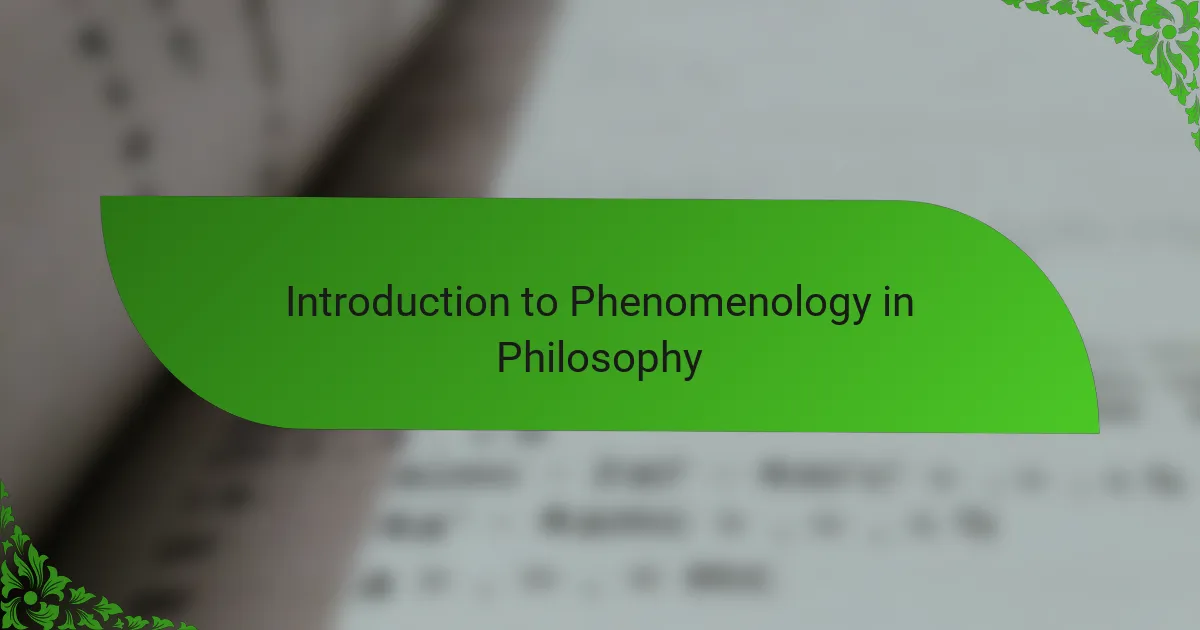
Introduction to Phenomenology in Philosophy
Phenomenology, to me, feels like peeling back the layers of everyday experience to reveal the raw essence beneath. Have you ever paused to truly observe how consciousness shapes the way you perceive the world? This approach invites us to suspend assumptions and dive into the immediate experience itself.
When I first encountered phenomenology, it was a little like turning on a light in a dim room—suddenly, ordinary moments gained new depth and significance. It’s not just about what we think but about how phenomena present themselves in our awareness. This shift in perspective challenged me to reconsider how meaning arises from lived experience.
I often wonder, why do we rarely question the way things appear to us? Phenomenology pushes us to explore this very question, emphasizing direct engagement with phenomena rather than detached analysis. It’s a method that feels both deeply personal and broadly philosophical, opening up a space for reflection on the nature of consciousness itself.
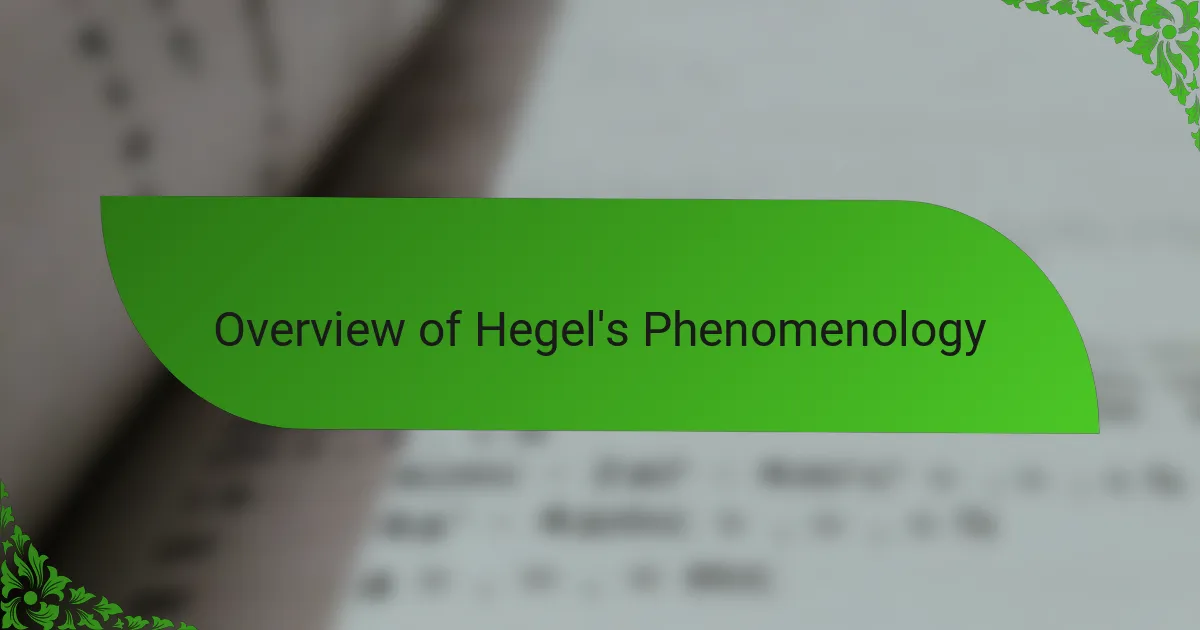
Overview of Hegel’s Phenomenology
Hegel’s Phenomenology of Spirit struck me as a demanding yet rewarding journey—one that takes consciousness through a complex progression toward self-understanding. Have you ever felt that your own sense of self is shaped by more than just isolated thoughts, but through a dynamic process of seeing and being seen? That’s exactly what Hegel explores: how our awareness unfolds by confronting challenges and contradictions within experience.
What surprised me most was how Hegel doesn’t simply describe consciousness as static but as something constantly evolving, almost like a story where each chapter builds upon the last. I felt drawn into this dialectical movement, where opposing ideas clash and then synthesize, pushing the spirit forward. This wasn’t abstract theory for me—it mirrored moments in my own life where confusion gave way to clarity.
I couldn’t help but ask, why does this evolution matter? To Hegel, the development of consciousness isn’t just an intellectual puzzle; it’s the foundation for freedom and self-realization. As I worked through his text, I realized this unfolding is both collective and deeply personal, inviting us to recognize the interconnectedness of our experiences and the world around us.
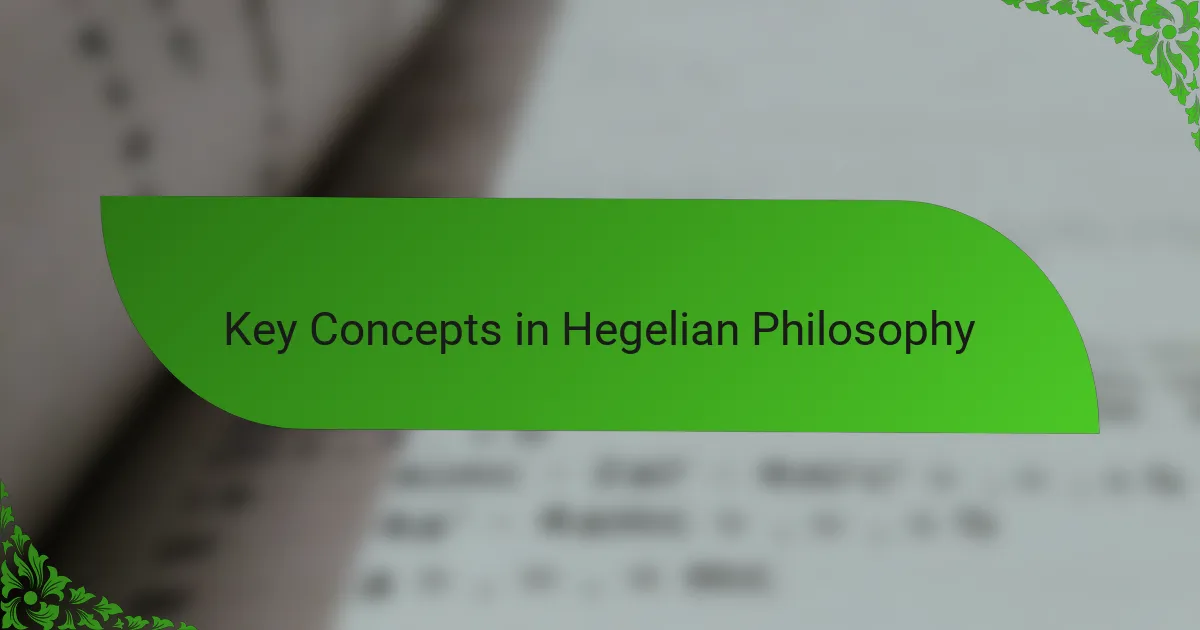
Key Concepts in Hegelian Philosophy
Hegel’s philosophy revolves around some key ideas that, at first, felt abstract but gradually revealed a surprising clarity. Take the concept of the dialectic—this back-and-forth movement of thesis, antithesis, and synthesis. It reminded me of everyday arguments where opposing views eventually lead to a new understanding, but on a much deeper, almost cosmic level.
Another concept that intrigued me was absolute Spirit, which isn’t just some distant metaphysical idea but a way of describing how consciousness and reality are intertwined. I found myself thinking: could our personal growth really mirror this expansive unfolding of Spirit? It felt like a hopeful vision, where our self-awareness connects with something far greater than ourselves.
Then there’s the idea of self-consciousness, which Hegel treats not as an isolated state but as something shaped through relationships and recognition. I often reflect on how my sense of identity changed when I realized it depends on others acknowledging me. It made me wonder if our deepest struggles with identity are really attempts to secure that vital recognition Hegel describes.
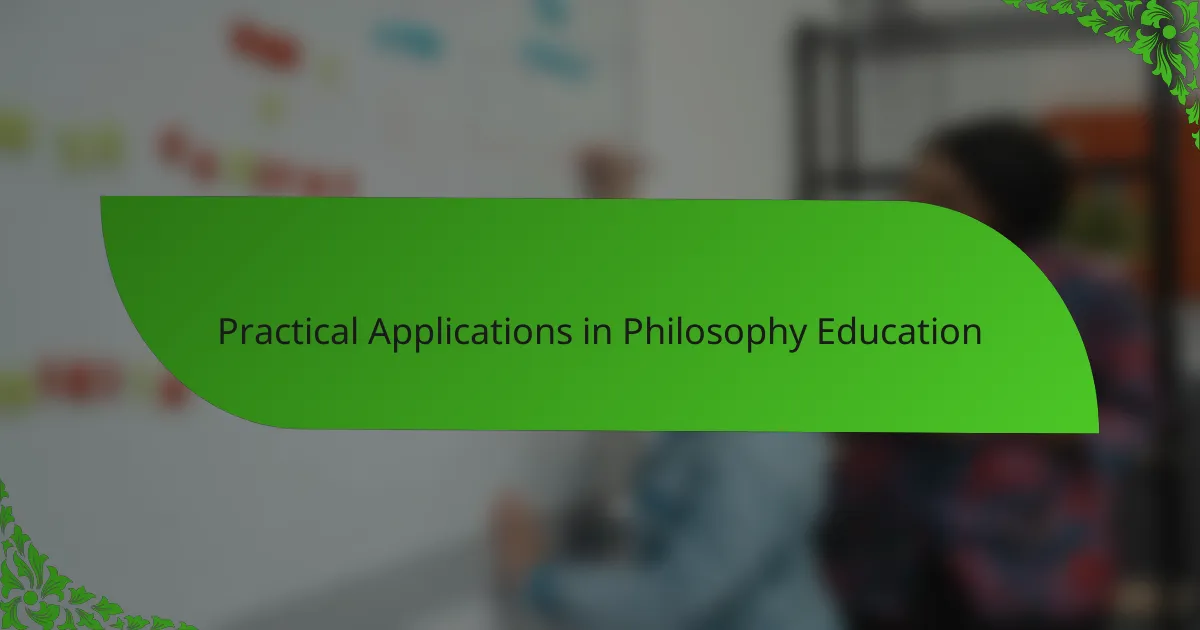
Practical Applications in Philosophy Education
When I started applying Hegel’s phenomenology in teaching philosophy, I noticed it transforms abstract concepts into lived experiences for students. Have you ever seen a classroom light up when a complex idea suddenly clicks? Guiding learners through the dialectical process encourages them to embrace contradictions rather than shy away from them, fostering deeper critical thinking.
I often ask my students to reflect on moments in their own lives where conflicting ideas led to new understanding. This practical exercise not only grounds Hegel’s theory but also makes philosophy feel alive and relevant. Watching their personal insights unfold reminds me that philosophy education thrives when it connects theory with real-world self-awareness.
What strikes me most is how embracing Hegel’s evolving consciousness framework helps learners develop intellectual humility and openness. It’s a subtle but powerful shift—from seeing knowledge as fixed to viewing it as a dynamic journey. In my experience, this change alone can make philosophy education more engaging and transformative.
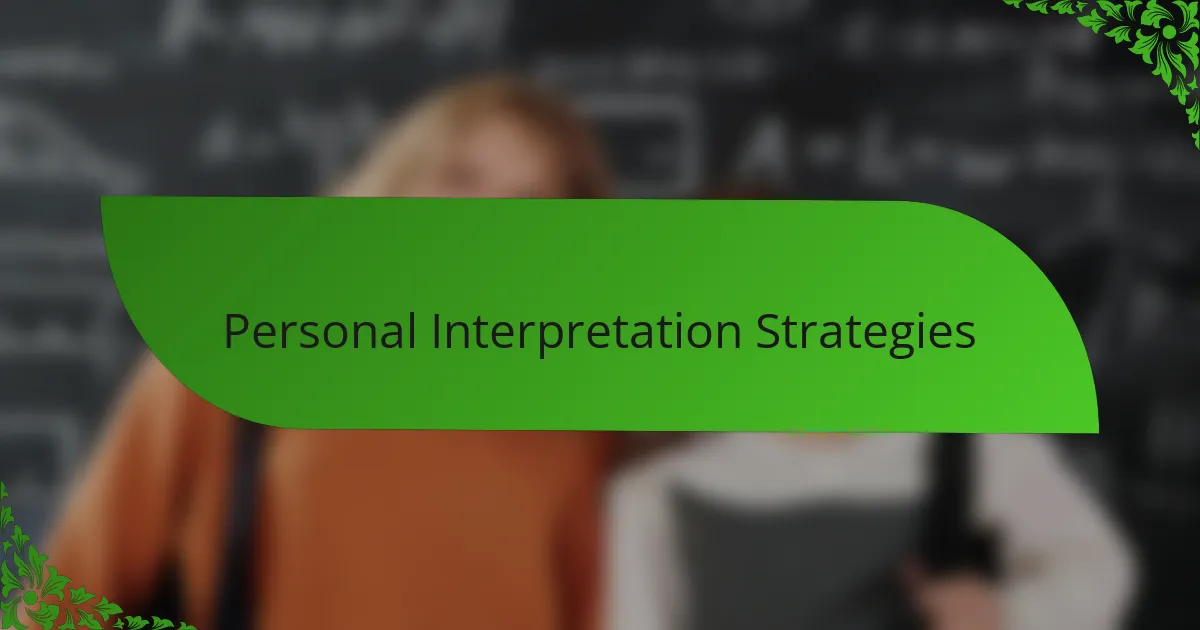
Personal Interpretation Strategies
Navigating Hegel’s Phenomenology felt overwhelming at first, so I developed a strategy of slow, deliberate reading combined with frequent pauses to jot down my reactions. Have you ever found that writing your immediate responses helps uncover meanings that might otherwise slip by? For me, this method transformed a dense text into a living dialogue between Hegel and myself.
Another tactic I found invaluable was connecting abstract sections with concrete examples from my own life—moments when I felt internal conflict or a shift in understanding. Reflecting this way, I could witness the dialectical process unfolding not just in theory but in personal experience. It made the philosophy feel less distant and more deeply human.
Sometimes I asked myself, “What is this passage trying to reveal about my own consciousness?” This question became a kind of compass, guiding me through complex ideas by anchoring them in self-reflection. I realized that interpreting Hegel isn’t only about grasping his concepts intellectually but about making them resonate within our own lived reality.
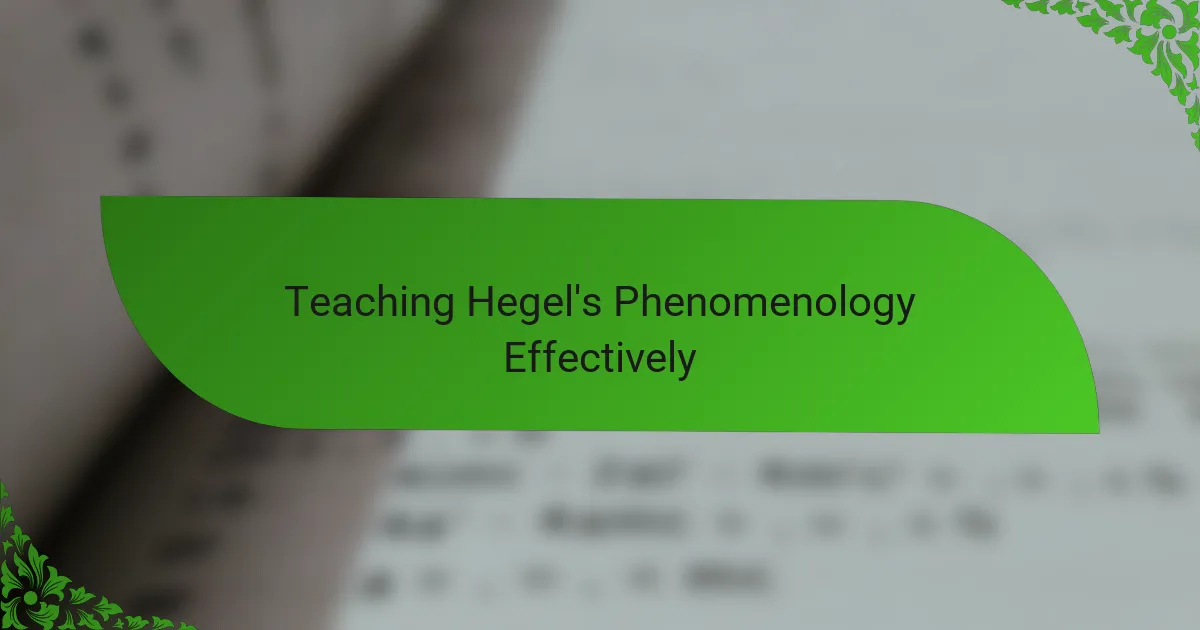
Teaching Hegel’s Phenomenology Effectively
Teaching Hegel’s Phenomenology effectively often hinges on embracing its complexity rather than simplifying it too soon. Have you noticed how resisting the urge to rush through difficult passages opens up a space for deeper reflection? From my experience, encouraging students to sit with confusion and even discomfort invites authentic engagement with Hegel’s dialectical process.
I’ve found that framing the text as a journey—one filled with unexpected turns and evolving perspectives—helps learners relate their own intellectual struggles to Hegel’s unfolding of consciousness. Sharing moments when I wrestled with contradictions in the text often puts students at ease, making the challenging material feel more like a shared adventure than an insurmountable barrier.
Another effective approach is prompting students to link abstract ideas to their own experiences, much like I’ve done in my personal study. Asking questions like, “Where have you encountered a conflict that led to new understanding?” transforms theory into lived insight. This connection grounds Hegel’s thought in reality, making philosophy not just something to study, but something to live.
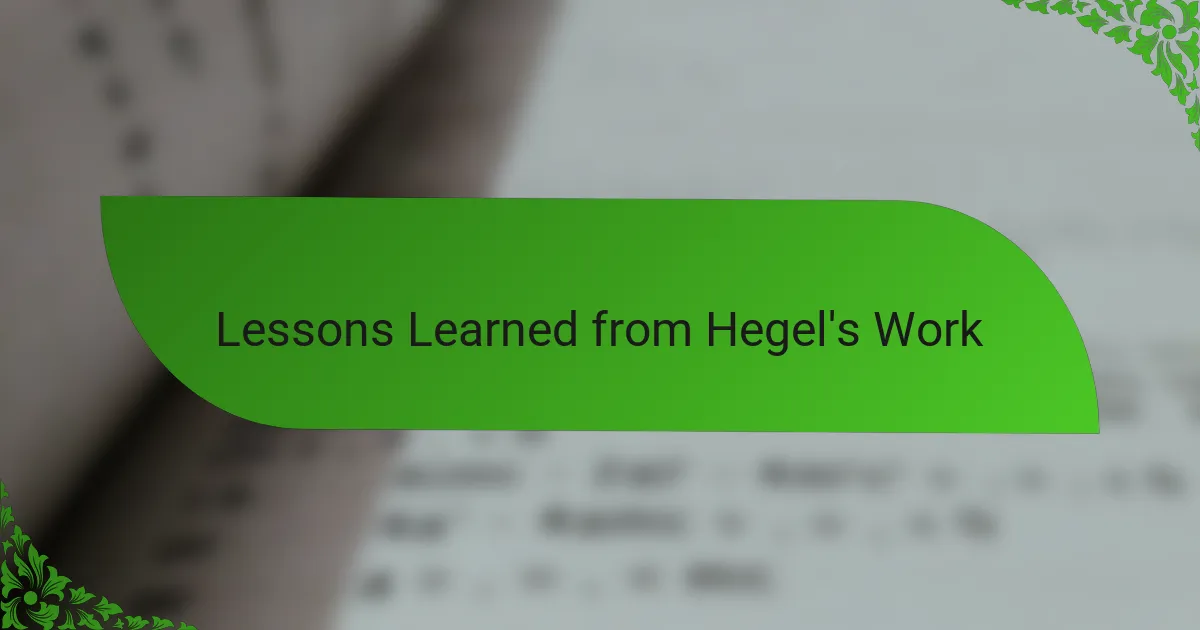
Lessons Learned from Hegel’s Work
One lesson that stayed with me deeply is how Hegel’s work teaches patience with complexity. Have you ever felt frustrated when something profound takes time to unfold? For me, engaging with his dialectical process felt like learning to walk through a fog—uncertainty was unavoidable, but the clarity that emerged rewarded persistence. It reminded me that personal growth and understanding rarely happen in a straight line.
I also learned that contradictions aren’t obstacles but essential drivers of insight. Encountering opposing ideas often felt uncomfortable, even unsettling, yet Hegel showed me these tensions spark the movement toward something richer. Reflecting on my own life, I can see how moments of inner conflict ultimately pushed me toward new awareness, much like the spirit’s journey he describes.
Perhaps the most profound takeaway was recognizing the social dimension of self-consciousness—that our identity is shaped through recognition by others. It made me ask, how often do I consider the ways my relationships influence who I am? This awareness added depth to my own struggles and triumphs and highlighted the communal fabric underlying personal experience.